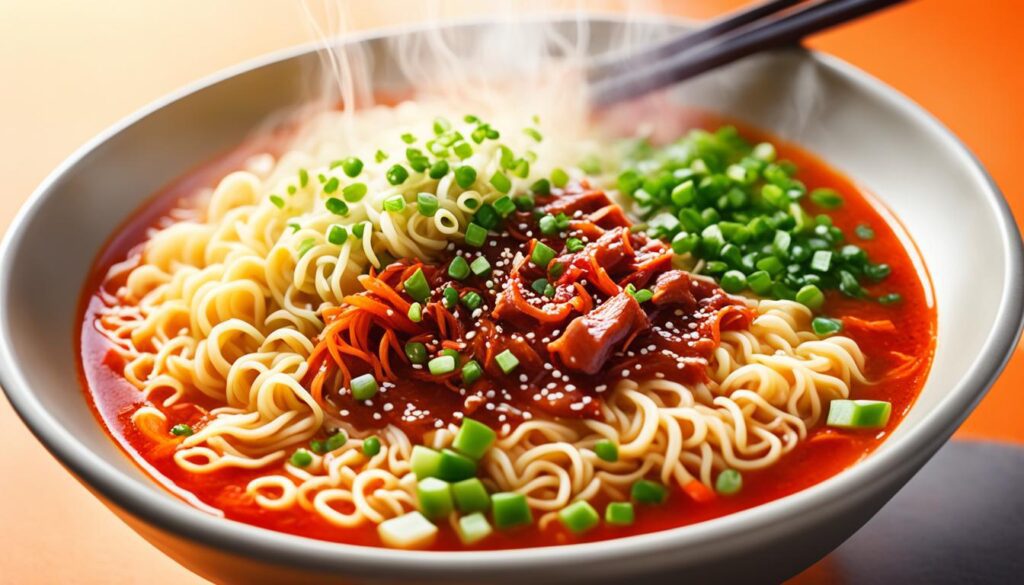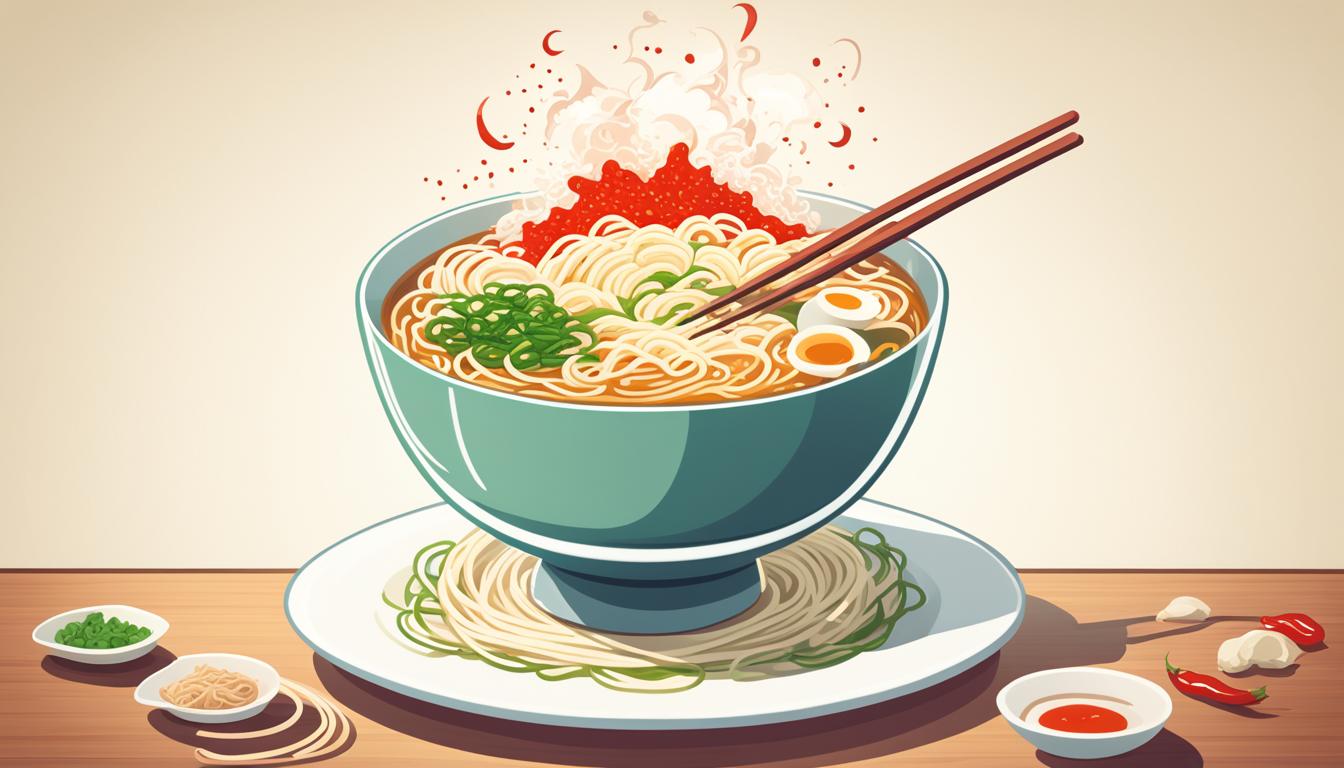Welcome to our guide on how to express “spicy food” in Japanese! If you’re a fan of fiery flavors and want to immerse yourself in the world of Japanese cuisine, this article will equip you with the necessary words and phrases to navigate spicy dishes with ease. Whether you’re a traveler exploring Japan or simply curious about Japanese culture, knowing how to describe spicy food will enhance your culinary experiences.
Before we dive into the details, let’s make sure you have a clear understanding of the meaning, grammar, and pronunciation of the Japanese term for “spicy food.” By the end of this guide, you’ll be able to confidently express your love for spicy dishes and enjoy the diverse range of flavors that Japan has to offer.
The Japanese Word for “Spicy”
When it comes to expressing “spicy” in Japanese, the word you’re looking for is “辛い” (karai). This versatile term can be used to describe any kind of spicy food, allowing you to convey your love for fiery flavors. It can also be written with the kanji “辛,” which you might commonly encounter in supermarkets, particularly on Korean instant noodle packages.
Using “karai” as an adjective, you can easily say “(something) wa karai” to indicate that “(something) is spicy.” For example, if you want to describe a spicy curry, you can say “このカレーは辛いです” (kono karee wa karai desu).
Now, let’s take a look at an example sentence to see “karai” in action:
Now that you know how to say “spicy” in Japanese, let’s explore the various levels of spiciness in the next section.
Levels of Spiciness in Japanese
In Japanese cuisine, expressing the spiciness level of dishes is just as important as exploring the flavors themselves. Japanese language offers various expressions to convey different levels of spiciness, enabling food enthusiasts to accurately describe their preferences. Below are some common terms used to communicate spiciness in Japanese:
| Spiciness Level | Japanese Expression |
|---|---|
| Mild or Sweet | 甘口 (amakuchi) |
| Medium Spicy | 中辛 (chuukara) |
| Hot or Spicy | 辛口 (karakuchi) |
While these terms are commonly used to describe the spiciness of any type of food, they are particularly relevant in the context of spicy cuisine in Japanese. Whether it’s spicy ramen, curry, or other fiery delicacies, you can now use these expressions to convey your preference with precision.
Describing Spicy Food in Japanese
To describe spicy food in Japanese, there are a few handy phrases you can use. The term for “spicy food” in Japanese is either “辛い料理” (karai ryouri) or “辛い食べ物” (karai tabemono). Both of these phrases mean “spicy food.” If you want to describe a specific spicy dish, you can use the adjective “辛い” (karai) followed by the name of the dish. For example, “辛いカレー” (karai karee) means “spicy curry.”
If you want to say “this curry is spicy,” you can say “このカレーは辛いです” (kono karee wa karai desu). This way, you can express your preference for spice and communicate your spicy food cravings in Japanese.
Sample Phrases:
| English | Japanese |
|---|---|
| This dish is spicy. | この料理は辛いです。 |
| I love spicy food. | 辛い料理が大好きです。 |
| She can’t handle spicy food. | 彼女は辛い料理が苦手です。 |
Now that you know how to describe spicy food in Japanese, you can confidently navigate menus and have enjoyable culinary adventures in Japan. Don’t be afraid to spice up your conversations with these new phrases.
Expressing Your Love for Spicy Food in Japanese

To express your love for spicy food in Japanese, you can use phrases like “辛いもの好き” (karaimono-zuki) or “激辛好き” (gekikara-zuki), which mean “I like spicy food” or “I love spicy food.” For example, you can say “辛いもの好きだから、担々麺を食べようかな” (karaimono-zuki dakara, tantan-men o tabeyou kana), which means “I love spicy food, so let’s have tantan-men.”
Translation Examples:
| English | Japanese |
|---|---|
| I like spicy food. | 辛いものが好きです。 |
| Spicy food is delicious! | 辛い料理はおいしいです! |
| I can handle spicy dishes. | 辛い料理は大丈夫です。 |
| This curry is really spicy! | このカレーは本当に辛いです! |
The Variety of Spicy Foods in Japan
While Japanese cuisine is often considered milder compared to other Asian cuisines, there is still a variety of spicy foods in Japan. Examples include Japanese curry (カレー) and tantan men (担々麺), both of which are popular among spicy food lovers. Japanese food has been influenced by Chinese, Korean, and Indian cuisine, allowing for a range of spicy options for those who enjoy fiery flavors.
Japanese curry, known as “カレー” (karee) in Japanese, is a flavorful and aromatic dish that packs a punch of heat. It often features a rich roux-based sauce and can be customized with different toppings and spice levels. Tantan men, on the other hand, is a type of ramen that originated from Sichuan, China. It typically consists of spicy broth, ground pork, and noodles, creating a mouthwatering and satisfying meal.
Whether you’re looking to explore spicy cuisine in Japanese or simply want to try the Japanese term for spicy food, Japan has plenty to offer. You can find restaurants specializing in spicy dishes or even try your hand at cooking them at home. The spicy level expressions in Japanese can help you navigate through the different heat levels and find the perfect balance for your taste buds.
So, whether you’re a fan of mild flavors or crave the fiery kick of spices, Japan’s Japanese spicy food translation provides a delightful range of options. From tantalizing curries to spicy ramen, you’ll discover a world of bold and flavorful dishes to satisfy your spicy cravings.

